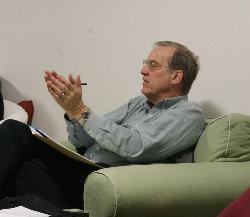
Colander began by pointing out that the goal of economics lies beyond textbook catch phrases such as optimization and efficient allocation of resources. Rather, it should be the creation of excellent decision-makers, who are instrumental not only in achieving society’s goals effectively through rigorous quantitative analysis, but also in defining these goals.
To do that, one needs broad understanding of the inter-relations between various disciplines, as well as big-picture thinking in the tradition of the liberal arts education. In this context, Colander criticized the tendency within the economic discipline – especially at graduate level – to shape specialists, who devote more time to deepening their understanding of a narrow niche, and less time to addressing those fundamental questions which can be answered differently, depending on different criteria; which have no definitive solutions but also tend to be the most interesting. This phenomenon, Colander explained, might be related to the incentives for professors to do research, given that more publications usually mean faster advancement in one’s career.
Colander said that although being a specialist does not preclude a broader trans-disciplinary grasp, it is nevertheless very challenging to strike the right balance between depth and breadth of knowledge (another version of this question is the allocation of time between a student’s major and so-called “general education” classes at liberal arts schools). In aid to this quest, Colander saw broader applications of technology in education, which might transform profoundly the way universities operate with the changes either imposed by the emergence of other competing models for education-provision, or internally driven by the institutions themselves.
Colander discussed what he considers two differentiated branches of economics: the “economic science” branch, and the “political economy” branch, which uses the insights of the discipline to address normative goals. Colander related the origin of the former to the deductive methods of mathematics (one assumes the existence of particular conditions and works from thereon), and the origins of the latter – to moral philosophy and what John Steward Mill refers to as “the art of economics.”
Professor David Colander is the C. A. Johnson Distinguished Professor of Economics at the Department of Economics at Middlebury College. Prior to Middlebury, he was the Kelly Professor of Distinguished Teaching at Princeton University. Colander has authored, co-authored, or edited over 35 books and 100 articles on a wide range of topics. He has been president of both the Eastern Economic Association and History of Economic Thought Society and is, or has been, on the editorial boards of numerous journals, including Journal of Economic Perspectives and the Journal of Economic Education.
By Snezhina Kovacheva (’09, Bulgaria)
